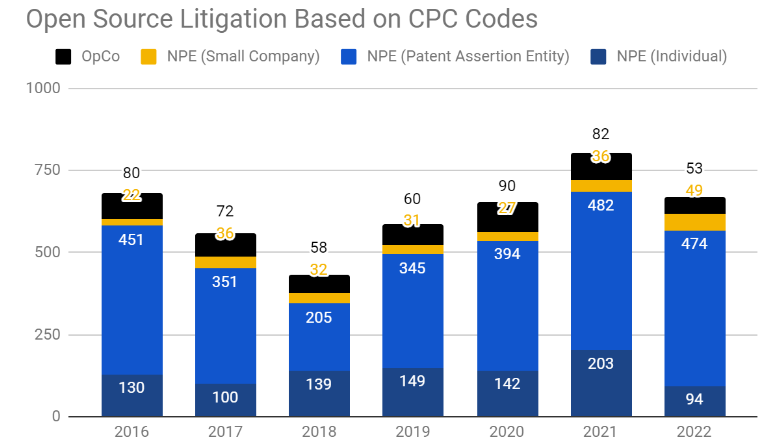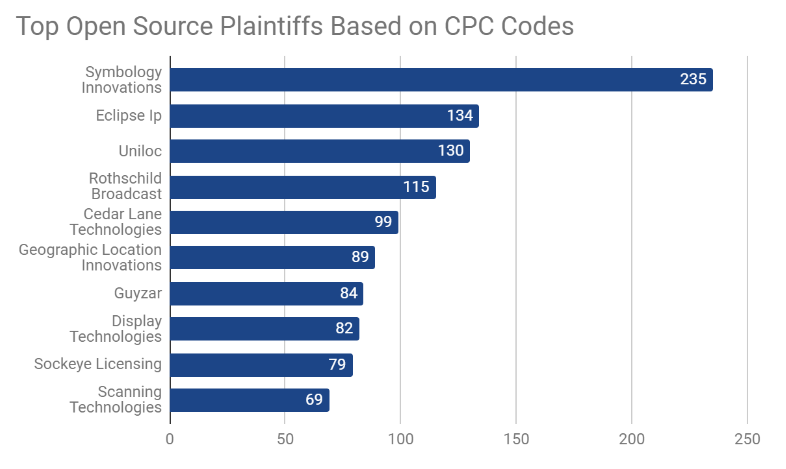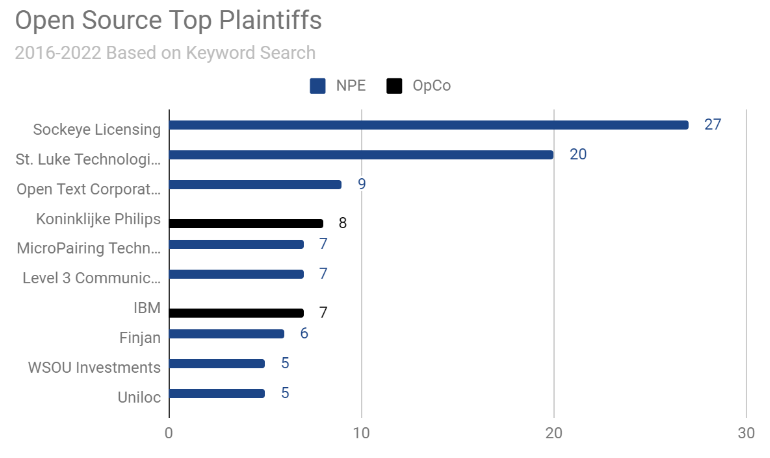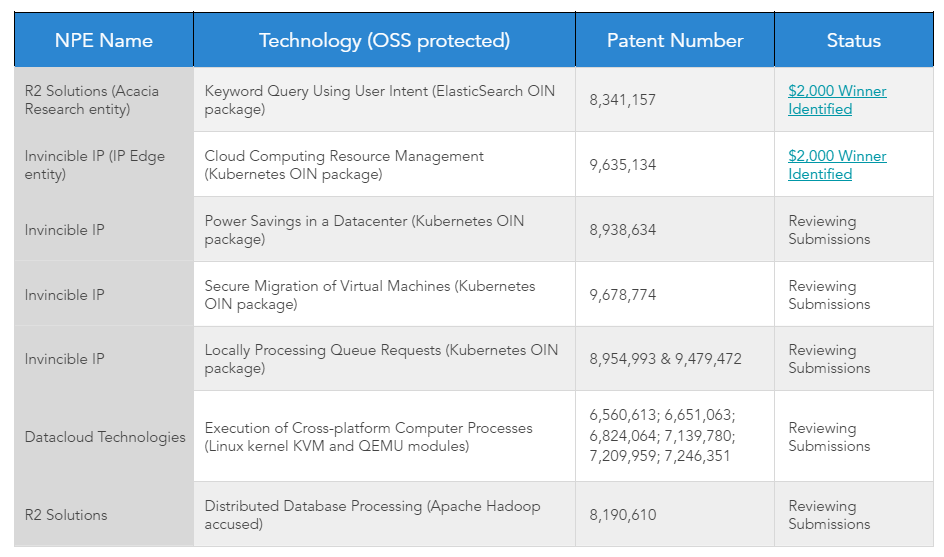Open Source is used daily by just about everyone, whether they know it or not. Whether it is Linux, Python, PHP, Apache, FileZilla, FireFox, or some other package, open source code projects are widely and commonly used across product categories. While the backbone of open source code was meant to be held open by all to allow others to make improvements and share those improvements, some have had other ideas. Indeed, non-practicing entities, or NPEs, have begun to sue open source projects and creators for patent infringement on overbroad software patents that likely never should have been issued.
Patents are tracked internationally by something called CPCs, i.e., the cooperative patent classification system. Each patent will be assigned multiple CPCs. When looking at patents bearing CPC codes related to Open Source Projects, NPE assertions have already nearly matched their 2021 totals as of June 6, 2022. In 2021, NPEs filed a total of 482 cases of patent infringement against open source packages; they have to date already seen 474 as of June of 2022. If this trend continues for the rest of the year, this would be an almost 100% increase from the previous year.
Looking specifically at all kinds of NPEs, open-source patent litigation has reached 617 cases, and is on track for over 1,200 cases. This would nearly double the total amount of cases brought in 721 against open source technologies.
Top plaintiffs include some of the most prolific NPEs, including litigation-financed entities like Uniloc. Well-known players, such as multiple Rothschild entities, can be found in the top 10 most aggressive entities asserting against open source technologies.
Since open source can be identified only broadly using CPC codes, we performed a far narrower keyword search to understand the true impact of NPEs suing even very common open source technologies. Key words such as “open source,” “royalty free agreement/software”, and “License or GNU or Android or Linux” were used.
Using keywords and performing a search and projections of just those results, the total number of 2022 cases is expected to match 2021 numbers for those specific technologies. It should be noted that this approach takes into account a much narrower class of litigations.
Again, this means that nearly 71% of all patent cases asserted against open source products are brought by NPEs, numbers akin to those in 2021.
The majority of assertions have been brought by NPEs, with 8 out of the top 10 being defined as a NPE. It is no surprise that companies like Uniloc and WSOU appear in the top 10, given how prolific they have been in general, filing hundreds of lawsuits.
Most of the highest-volume defendants are well-known technology companies like Google, Samsung, and Apple, though a large number of smaller companies have been sued a handful of times each.
Unified Patents launched this zone in 2019, in part to deter NPEs from monetizing invalid patents in the space. When looking at IPRs and by reexaminations, Unified has had a success rate of nearly 90% in its Open Source Zone and has settled with and licensed several NPEs.
Below are a few exemplary Open Source Filings, some general open source packages implicated, and the outcomes of those challenges.
Recent challenges include DataCloud Technologies, an IP Investment entity. DataCloud asserted US 6,560,613 relating to disambiguating file types on a computer system (accuses Linux kernel KVM and QEMU modules). This NPE asserted the patent against 10 companies, including Box, Extreme Networks, F5 Networks, 1&1 Ionos, Wix.com, Arista, Squarespace, Limelight Networks, Check Point Software, and Newfold Digital. Unified filed IPR on Dec. 22, 2020 and was Instituted on Jul. 21, 2021.
Another example is an IP Investment entity Accelerated Memory Tech. This NPE asserted US 6,513,062 relating to managing resources to cache information to the cloud (accusing, inter alia, the use of open source project Redis). There have been 5 entities sued to date, including Hulu, Citrix Systems, Barracuda Networks, Kemp Technologies, and F5 Networks. The IPR was terminated due to the patent owner disclaiming all claims of the patent.
Unified also recently filed an Ex Parte Reexamination against Sound View Innovations. This NPE asserted US 6,725,456 relating to ensuring quality of service in an operating system (accusing, inter alia, Apache Hadoop). The patent was originally owned by Nokia, and was asserted against Vudu, Walmart, Delta Air Lines, Cigna, Sling TV, and DISH Network. Unified filed a reexamination on Aug. 6, 2020; Granted on Sept. 11, 2020; and Non-Final Office Action on Feb. 26, 2021.
In addition to recent challenges, in the last 6 months Unified has launched over 32 crowdsourced prior art contests related to Open Source projects that have resulted in over 200 submissions. A few examples are listed below.
Definitions
Sectors
High-Tech = Technologies relating to Software, Hardware, and Networking
Medical = Technologies relating to Pharmaceuticals, Medical Devices, Health Related Technologies
Other = Technologies relating to Mechanical, Packaged Goods, Sporting Equipment and any other area outside of high-tech and medical patents.
Entities
Non Practicing Entity (NPE) = Company which derives the majority of its total revenue from Patent Licensing activities.
Operating Company, OpCo, or Op. Co. = Company which derives most of its total revenue from Product Sales or Services. Could be an SME or a large company.
Other Entity = Universities / Non-Profits / Government / Non-Governmental Organizations (NGOs)
NPE (Patent Assertion Entities) = Entity whose primary activity is licensing patents and acquired most of its patents from another entity
NPE (Small Company) = Entity whose original activity was providing products and services, but now is primarily focused on monetizing its own patent portfolio.
NPE (Individual) = Entity owned or controlled by an individual inventor who is primarily focused on monetizing inventions patents by that individual inventor.
Venues
CACD = Central District of California
CAND = Northern District of California
DED = Delaware
NJD = New Jersey
NDIL = Northern District of Illinois
SDNY = Southern District of New York
TXED = Eastern District of Texas
TXWD = Western District of Texas
Methodology
This report includes all District Court and PTAB litigations between January 1, 2016 and June 6, 2022.
Total number of reported cases can vary based on what is included. Unified made its best attempt to eliminate mistaken, duplicative, or changes in venue filings, hence the totals may vary slightly compared to other reporting entities. Statistics include litigations initiated by NPEs or Declaratory Judgments (DJs) initiated by operating companies against NPEs.
Unified strives to accurately identify NPEs through all available means, such as court filings, public documents, and product documentation.
Copyright © 2022, Unified Patents, LLC. All rights reserved.












